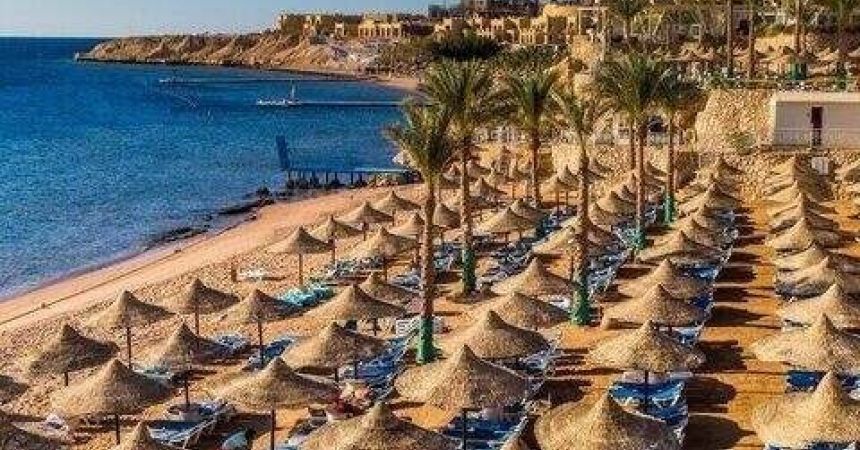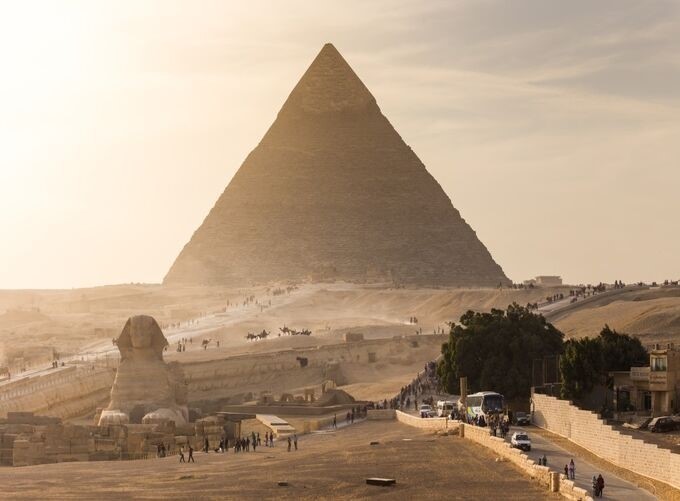
Egypt Travel Guide: Land of Pharaohs and Pyramids
Egypt, often described as the cradle of civilization, boasts a rich tapestry of history and culture that stretches back thousands of years. Known for its monumental architecture, ancient temples, and legendary Nile River, Egypt presents a unique travel experience that combines historical exploration with natural beauty and modern amenities. Whether you’re drawn to its iconic landmarks, vibrant cities, or stunning natural landscapes, this guide will help you plan Egyptian adventure.
Top Destinations in Egypt
-
Cairo: The Heart of Egypt
Cairo, Egypt’s bustling capital, is a vibrant metropolis with a rich history and a gateway to some of the country’s most famous landmarks. It’s a city where the ancient and modern worlds coexist, offering a dynamic blend of cultural experiences.
Must-See Attractions in Cairo:
- Pyramids of Giza and the Sphinx: No vacation to Egypt is complete without visiting the iconic pyramids of Giza, including the Great Pyramid of Khufu, the Pyramid of Khafre, and the Pyramid of Menkaure. The nearby Sphinx, with its enigmatic gaze, adds to the allure of this ancient site.
- Egyptian Museum: Home to an extensive collection of ancient artifacts, including the treasures of Tutankhamun, the Egyptian Museum is a must-visit for history enthusiasts.
- Khan El Khalili Bazaar: Experience the vibrant atmosphere of Cairo’s largest market, where you can shop for souvenirs, spices, textiles, and traditional crafts.
- Islamic Cairo: Explore the historic district of Islamic Cairo, home to impressive mosques, including the Mosque of Muhammad Ali and the Sultan Hassan Mosque.
Tips:
- Spend 2-3 days in Cairo to explore its major attractions and enjoy its lively atmosphere.
- Be prepared for traffic congestion and consider using ride-sharing apps or private tours for convenience.
-
Luxor: The City of Temples
Luxor, often referred to as the world’s greatest open-air museum, is a city rich in ancient history and monumental architecture. It’s the gateway to some of Egypt’s most famous archaeological sites.
Must-See Attractions in Luxor:
- Karnak Temple: Discover the vast Karnak Temple complex, renowned for its grand halls, towering columns, and intricate hieroglyphs.
- Valley of the Kings: Explore the burial place of pharaohs, including the tomb of Tutankhamun. The Valley of the Kings offers a glimpse into ancient Egyptian funerary practices.
- Hatshepsut Temple: Visit the mortuary temple of Queen Hatshepsut, an architectural marvel set against the backdrop of towering cliffs.
- Luxor Temple: Stroll through Luxor Temple, beautifully illuminated at night and known for its massive columns and statues.
Tips:
- Allocate 2-3 days in Luxor to explore its extensive archaeological sites and enjoy a felucca ride on the Nile River.
- Consider hiring a guide to enhance your understanding of the historical significance of the sites.
-
Aswan: A Tranquil Oasis
Aswan, located in southern Egypt, is known for its serene beauty and historical significance. It’s a perfect destination for those seeking a more relaxed pace and an opportunity to explore Nubian culture.
Must-See Attractions in Aswan:
- Philae Temple: Visit the Temple of Isis on Philae Island, which was relocated to its current location to save it from the rising waters of Lake Nasser.
- Abu Simbel: Take a day trip to Abu Simbel, where the colossal temples of Ramses II and his queen Nefertari are carved into the rock, showcasing extraordinary artistry.
- Aswan High Dam: Learn about the engineering marvel of the Aswan High Dam, which has played a crucial role in controlling the Nile River and generating hydroelectric power.
- Nubian Village: Explore a traditional Nubian village, where you can experience the unique culture, colorful houses, and hospitality of the Nubian people. Egypt cultural tours
Tips:
- Spend 1-2 days in Aswan to explore its key attractions and enjoy a relaxing boat ride on the Nile.
- Consider taking a cruise from Aswan to Luxor for a leisurely and scenic journey.
-
Alexandria: Mediterranean Charm
Overview:
A day trip to Alexandria, located on the Mediterranean coast, is a city with a rich cultural and historical heritage. Founded by Alexander the Great, it has been a major center of learning and culture throughout history.
Must-See Attractions in Alexandria:
- Bibliotheca Alexandrina: Visit the modern Library of Alexandria, a tribute to the ancient Great Library, and explore its impressive collection and architectural design.
- Qaitbay Citadel: Explore the 15th-century Qaitbay Citadel, built on the site of the ancient Lighthouse of Alexandria, one of the Seven Wonders of the Ancient World.
- Catacombs of Kom El Shoqafa: Discover the underground necropolis of Kom El Shoqafa, a fascinating site featuring a blend of Egyptian, Greek, and Roman architectural styles.
- Montazah Palace and Gardens: Relax in the lush gardens and enjoy the scenic views from Montazah Palace, once a royal summer residence.
Tips:
- Allocate 1-2 days in Alexandria to explore its historical sites and enjoy the Mediterranean ambiance.
- Take a leisurely stroll along the Corniche and savor fresh seafood at local restaurants.
-
Sharm El Sheikh and Hurghada: Red Sea Paradise
Sharm El Sheikh and Hurghada are popular resort towns on the Red Sea, known for their stunning beaches, clear waters, and vibrant marine life. They offer excellent opportunities for relaxation and water-based activities.
Must-See Attractions in Sharm El Sheikh:
- Ras Mohammed National Park: Explore the protected marine park, known for its exceptional diving and snorkeling spots, coral reefs, and diverse marine life.
- St. Catherine’s Monastery: Take a day trip to this ancient monastery located at the foot of Mount Sinai, a significant site for both Christian and Islamic heritage.
- Luxor and Aswan Day Trips: Consider taking day trips from Sharm El Sheikh or Hurghada to visit Luxor and Aswan, allowing you to combine beach relaxation with historical exploration.
Tips:
- Spend 2-4 days in Sharm El Sheikh or Hurghada to enjoy the beaches, water activities, and resort amenities.
- Book excursions and activities in advance, especially during peak tourist seasons.

Practical Travel Tips for Egypt
-
Visa and Entry Requirements
Visas:
- Most visitors to Egypt require a tourist visa, which can be obtained upon arrival at the airport or in advance from Egyptian consulates. Check the latest visa requirements for your nationality before traveling.
Passport Validity:
- Ensure your passport is valid for at least six months beyond your planned departure date from Egypt.
-
Language and Currency
Language:
- Arabic is the official language of Egypt. English is widely spoken in tourist areas, but learning a few basic Arabic phrases can enhance your experience.
Currency:
- The currency used in Egypt is the Egyptian Pound (EGP). Credit and debit cards are accepted in major cities and tourist areas, but carrying cash is advisable for smaller towns and markets.
-
Health and Safety
Vaccinations:
- Check recommended vaccinations before traveling to Egypt and carry a basic first-aid kit.
Safety:
- Egypt is generally safe for tourists, but it’s important to stay informed about local conditions and follow common-sense safety practices. Avoid large crowds and be cautious in busy areas.
-
Transportation in Egypt
Internal Flights:
- Egypt has a well-developed domestic flight network, with airlines such as EgyptAir offering flights between major cities and tourist destinations.
Public Transportation:
- Major cities have public transportation options, including buses, taxis, and microbuses. In Cairo, the metro system is a convenient way to travel.
Taxis and Ride-Sharing:
- Taxis are widely available in cities, but it’s advisable to use ride-sharing apps like Uber or Careem for safety and convenience.
Ferries:
- Ferries are a popular way to travel between cities along the Nile and to visit certain islands.
-
Accommodations in Egypt
Types of Accommodation:
- Egypt offers a range of accommodations, from luxury hotels and resorts to budget guesthouses and hostels. In tourist areas, you’ll find a variety of options to suit different preferences and budgets.
Booking:
- Book accommodations in advance, especially during peak travel seasons and major holidays, to secure the best rates and availability.
Cultural Etiquette
Dress Code:
- Dress modestly when visiting religious sites and rural areas. Light, comfortable clothing is suitable for the hot climate, but avoid revealing outfits in conservative areas.
Tipping:
- Tipping is customary in Egypt. In restaurants, a tip of 10-15% is appreciated. Tipping is also common for hotel staff, tour guides, and taxi drivers.
Hospitality:
- Egyptians are known for their warmth and hospitality. Respect local customs and be polite in interactions with locals.
-
Food and Drink
Cuisine:
- Egyptian cuisine is diverse and flavorful, with dishes such as koshari, falafel, and shawarma. Don’t miss the opportunity to try traditional dishes and street food.
Water:
- Drink bottled water to avoid potential stomach issues. Avoid ice and raw fruits or vegetables washed in tap water.
Travel to Egypt: History and Adventure
Egypt, with its awe-inspiring monuments, vibrant culture, and diverse landscapes, offers an unforgettable travel experience. Whether you’re exploring ancient temples, relaxing on the Red Sea coast, or immersing yourself in the bustling energy of Cairo, Egypt’s rich history and warm hospitality will leave a lasting impression. By following this comprehensive travel guide, you’ll be well-prepared to embark on a remarkable journey through the land of the Pharaohs. Enjoy your adventure in Egypt, where the past and present intertwine to create a truly magical experience.



